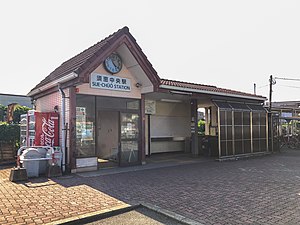Sue-Chūō Station
JD 14 Sue-Chūō Station 須恵中央駅 | |
|---|---|
 Sue-Chūō Station in 2017 | |
| Location | Sue, Kasuya-gun, Fukuoka-ken 811-2113 Japan |
| Coordinates | 33°35′13″N 130°30′18″E / 33.58694°N 130.50500°ECoordinates: 33°35′13″N 130°30′18″E / 33.58694°N 130.50500°E |
| Operated by | |
| Line(s) | ■ Kashii Line |
| Distance | 23.1 km from Saitozaki |
| Platforms | 1 side platform |
| Tracks | 1 |
| Construction | |
| Structure type | At grade |
| Bicycle facilities | Bike sheds |
| Other information | |
| Status | Remotely managed station |
| Website | Official website |
| History | |
| Opened | 11 March 1989 |
| Passengers | |
| FY2016 | 1,384 daily |
| Rank | 127th (among JR Kyushu stations) |
| Location | |
 JD 14 Sue-Chūō Station Location within Japan | |
Sue-Chūō Station (須恵中央駅, Sue-Chūō-eki) is a railway station on the Kashii Line operated by JR Kyushu in Sue, Fukuoka Prefecture, Japan.[1]
Lines[]
The station is served by the Kashii Line and is located 23.1 km from the starting point of the line at Saitozaki.[2]
Station layout[]
The station, which is unstaffed, consists of a side platform serving a single track. The station building is of modern construction with tiled roof and houses a small waiting area and automatic ticket machines. A bike shed is provided next to the station building and another one on the station forecourt opposite.[2][3]

A view of the station platform and track.
A view of the station forecourt.
Adjacent stations[]
| ← | Service | → | ||
|---|---|---|---|---|
| Kashii Line | ||||
| JD 13 Sue | Local | JD 15 Shinbaru | ||
History[]
The station was opened by JR Kyushu on 11 March 1989 as an additional station on the existing track of the Kashii Line.[4][5]
On 14 March 2015, the station, along with others on the line, became a remotely managed "Smart Support Station". Under this scheme, although the station became unstaffed, passengers using the automatic ticket vending machines or ticket gates could receive assistance via intercom from staff at a central support centre.[6]
Passenger statistics[]
In fiscal 2016, the station was used by an average of 1,384 passengers daily (boarding passengers only), and it ranked 127th among the busiest stations of JR Kyushu.[7]
References[]
- ^ "JR Kyushu Route Map" (PDF). JR Kyushu. Retrieved 3 March 2018.
- ^ Jump up to: a b Kawashima, Ryōzō (2013). 図説: 日本の鉄道 四国・九州ライン 全線・全駅・全配線・第3巻 北九州 筑豊 エリア [Japan Railways Illustrated. Shikoku and Kyushu. All lines, all stations, all track layouts. Volume 3 Kyushu Chikuhō area] (in Japanese). Kodansha. pp. 31, 71. ISBN 9784062951623.
- ^ "須恵中央駅" [Sue-Chūō]. hacchi-no-he.net. Retrieved 5 March 2018.
- ^ Ishino, Tetsu; et al., eds. (1998). 停車場変遷大事典 国鉄・JR編 [Station Transition Directory - JNR/JR] (in Japanese). I. Tokyo: JTB Corporation. p. 220. ISBN 4533029809.
- ^ Ishino, Tetsu; et al., eds. (1998). 停車場変遷大事典 国鉄・JR編 [Station Transition Directory - JNR/JR] (in Japanese). II. Tokyo: JTB Corporation. p. 696. ISBN 4533029809.
- ^ "香椎線の各駅が「Smart Support Station」に変わります" [Stations on the Kashii Line to become "Smart Support Stations"] (PDF). JR Kyushu. 22 December 2014. Retrieved 5 March 2018.
- ^ "駅別乗車人員上位300駅(平成28年度)" [Passengers embarking by station - Top 300 stations (Fiscal 2016)] (PDF). JR Kyushu. 31 July 2017. Archived from the original (PDF) on 1 August 2017. Retrieved 3 March 2018.
| Wikimedia Commons has media related to Sue-Chūō Station. |
External links[]
- Sue-Chūō (JR Kyushu)(in Japanese)
- Stations of Kyushu Railway Company
- Railway stations in Fukuoka Prefecture
- Railway stations in Japan opened in 1989
- Fukuoka Prefecture railway station stubs


